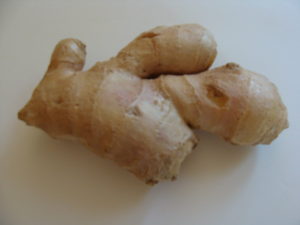As a Chinese herbalist, I find myself confronted with a number of questions every time I prescribe an herbal formula for one of my patients. Is my diagnosis correct? Am I prescribing the most effective formula for this particular patient? And even if I have the right formula for the right patient, will they actually take the herbs I’ve prescribed?
Two factors in whether of not a patient will take an herbal formula regularly enough and long enough for it to be effective are convenience and taste. Chinese herbs come in a variety of forms, including raw herbs, powders, capsules, and something called teapills. I tend to suggest capsules and teapills for my patients, occasionally recommending powders, but rarely suggest raw herbs. They have to be boiled for a period of time and the taste of many of the herbs range from seriously bitter to tasting like dirt.
There are exceptions, however, and one of those exceptions is my favorite herb: ginger root. It tastes good, can be ingested in a variety of ways, has a wide range of effective uses, and can enhance your acupuncture treatment. Ginger is a warm herb that can be taken as a tea, grated into hot water or broth, cut up and used to spice up your favorite stir fry, and can be baked into cookies. In Chinese herbology its use is widespread and includes the following:
- Ginger can help if you’re coming down with a cold or the flu. Combine grated ginger root with scallions in water or broth. Boil the broth until it’s hot and drink it down. Wrap up and go to bed. The combination of ginger and scallions is hot and should make you sweat a little, but hopefully enough to head off the cold before it settles in for the next week or so.
- If you’re feeling nauseous, ginger is just what you need. It’s known to help with everything from morning sickness to nausea from chemotherapy. Again, grate some ginger into water, heat it and drink. You can also find ginger powder in capsules at a health food store or Chinese herbal pharmacy.
- Ginger warms your stomach, and is considered a digestive aid. In this case, you can drink the ginger grated into hot water or eat candied ginger, ginger cookies, or pickled ginger after your meal.
- Did you ever wonder why you always get pickled ginger with your sushi? It’s there because ginger can offset the toxicity of a bad piece of fish. Who knew? Furthermore, ginger is often used in some herbal formulas to balance out the effects of other mildly toxic herbs.
- Ginger can also relieve the symptoms of dysentery. Seriously. It increases the secretion of gastric juices, so your food is digested more quickly. This creates an unfriendly environment for any bacteria that might otherwise hang around and make you sick.
- The skin of the ginger root is useful, too. It’s used in Chinese medicine as a diuretic; to promote urination as a way of reducing edema (water swelling).
So where can you get some of this fabulous herb? Raw ginger root is found in the produce section of most grocery stores. It will last a long time in your refrigertor, and it freezes well, too.You can also find pickled ginger in jars in the Asian food aisle. If it’s powdered ginger you’re after, check out the spice section or a Chinese herbal pharmacy.




